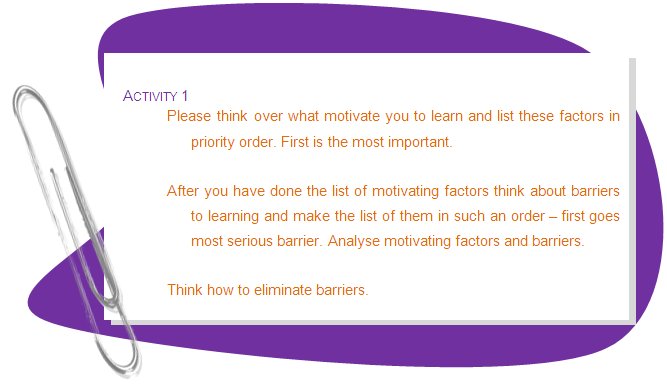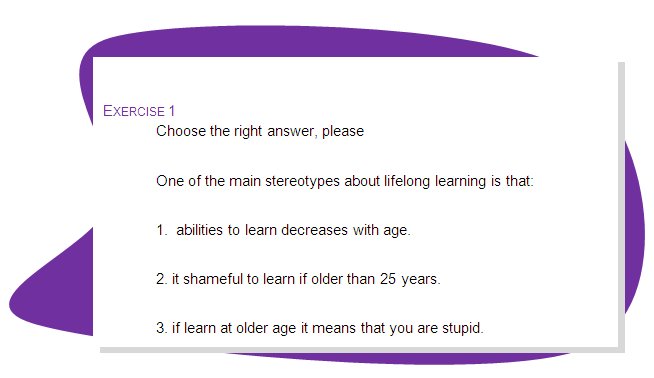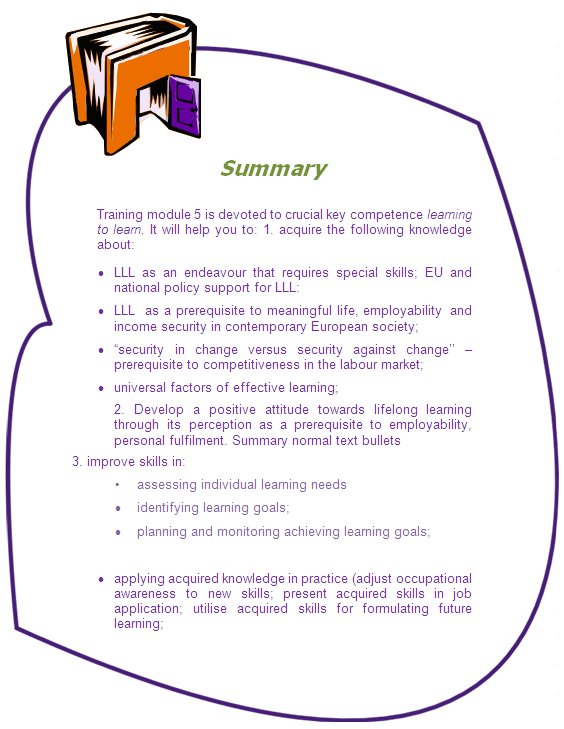Key Competencies Kit
for Facing Lifelong Learning


 |
This Project has been funded with support from the European Commission. This communication reflects the views only of the author, and the Commission can not be held responsible for any use which may be made of the information contained therein. |
 |
Didactic Unit 5 |
Theme |
Time |
Motivation to learn |
stereotypes about LLL; |
2 hours |
new factors of employability and competitiveness in the labour market; |
||
advantages of LLL beyond labour market: community building; quality parenting and family life; |

One of the main stereotypes about lifelong learning is that abilities to learn decreases with age. Age stereotypes on the other hand are problematic in lifelong learning a study revealed that learning ability and readiness, flexibility and creativity are all associated with young learners, whereas older learners are ascribed discipline, quality consciousness and loyalty.
Age research revealed that: learning capability does not decrease with age but by lack of practice.
Despite this fact– age stereotypes remain the biggest obstacle for lifelong learning.
Older learners are perceived to learn slowly, be inflexible, possess insufficient computer skills, or show poor training performance.
Research results show that learning capability does not necessarily decrease with age, but mainly by lack of practice. As long as the brain is trained continuously, learning is possible throughout one’s entire life. Learning capability does not decrease with age, lifelong learning imperative to counter demographic change. |
In actual fact, the skills that people have - or lack - have an importance that goes over and beyond their employability. Skills also have a critical impact on:
Very often one can come across such arguments for lifelong learning as improved qualification, ability to adjust to the new employer’s demands and meet challenges in the labour market, in other words, to become more competitive in seeking and keeping job. These advantages are very important for everybody, indeed. Decent, well paid and secure job is an important prerequisite to well being.
However, benefits of lifelong learning go far beyond competitiveness in the labour market or ability to earn good income they make positive impact on personality and enriches everyday life.
Here are some of them that will help you to recognise the need to learn and to seek new knowledge:
1. Lifelong learning skills help fully develop natural abilities;
Lifelong learning skills open the mind. An integral part of lifelong learning skills is the ability of exchange of ideas and viewpoints. There’s nothing like listening to or taking part in stimulating discussions to help us see the other side of an issue. That give-and-take opens our minds. Lifelong learning skills create a curious mind. The more learners discover the more they want to learn.2. Lifelong learning skills increase your wisdom and enable you to put your live in perspective. It increases our understanding of the whys and the whats of previous successes and failures, and it helps us understand ourselves better. We more fully develop the wisdom that can come with later life.
3. Lifelong learning skills help us adapt to change. Knowledge society is in a state of constant flux. Often as we age we might feel like the proverbial “old dog that can’t learn new tricks.” “Not true at all lifelong learning skills enable us to keep up with society’s changes. Moreover, learning environment with our peers not only makes it possible to stay abreast of change, it also makes it fun.
4. Lifelong learning skills keep us involved as active contributors to society.
5. Lifelong learning skills help us make new friends and establish valuable relationships. No one enjoys loneliness. Through lifelong learning, people are meeting new people, forging friendships and relationships with others, and enjoying an active social life. Lifelong learning is a brilliant way to keep in touch with people, meet new friends, and enjoy life surrounded by the company of folks who are truly embracing the excitement of our later years.
6. Lifelong learning skills lead to an enriching life of self-fulfilment. They strengthen the belief that our capacity to learn does not decrease as our years increase.
Since poor skills have a sapping effect on people's self-confidence, they also reduce individuals' capacity - and their willingness - to act to improve their situation. Adults who are socially disadvantaged are much less likely than the general population to be engaged in learning.
Lifelong learning is the idea of learning at all stages of life (from early childhood to old age) and in all its modes (formal, non-formal and informal).
Learning is a continuous process in which an individual's results and motivation for learning in a certain period of life depend on learning skills, the knowledge, habits and experiences of learning, acquired at a younger age.
Acquiring and continuously updating and upgrading skills and competences is considered a prerequisite for the personal development of all citizens and for participation in all aspects of society.
The vulnerability to unemployment as well as the ‚list‘ of people most disadvantaged in the labour market are not new what is new is the root causes and manifestations of vulnerability that have changed profoundly over the last decade.
At present time vulnerability in the labour market manifests itself not only within a narrow circle of ‘traditionally vulnerable to unemployment groups’ like - low skilled, disabled, women, migrants.
Exposure to risks of unemployment can affect any group in society as ‘all groups face vulnerabilities that are largely the outcome of rapid socio-economic change.
Rapid social and economic changes affect the employment prospects of different groups and also influence the characteristics of those who are vulnerable. For example, middle-aged men (the majority of whom were qualified workers) have been excluded from the labour market through the steep decline in manufacturing between 1992 and 1995 in Lithuania as in many other former soviet countries.
Since 2004, when Lithuania joined the EU, the process of Eurointegration started to ‘shape’ root causes of vulnerability to unemployment. In Lithuania, as in other new Member States, national companies have expanded their operation abroad, so for the majority of jobs (not necessarily high qualified) good command of foreign language has become crucial.
Inflow of foreign tourists has increased language requirements for many jobs in services (shops, hotels, restaurants...). This situation made much more difficult for people over forty years of age (the majority of whom have no relevant language skills and who are not ready to learn) to stay in job or to find new job.
Changing societies and labour markets are making one group of people insecure in their jobs while offering new opportunities for the other. In this context there no ‘right’ skills or competences that can ensure secure life employment. The underlying pattern of vulnerability is inability to adjust to changes and to learn on life long basis.
Nowadays one should seek security in change versus security against change
Lack of life long learning skills significantly ‘aggravates other, traditional, factors of vulnerability (gender, disability, age, belonging to ethnic minority and other).
 |
Important aspect of adult learning is motivation. At least five factors serve as sources of motivation for adult learning:
|
Unlike children and teenagers, adults have many responsibilities that they must balance against the demands of learning. Because of these responsibilities, adults have barriers against participating in learning. Some of these barriers include lack of time, money, confidence, or interest, lack of information about opportunities to learn, scheduling problems, "red tape," and problems with child care and transportation.
Motivation factors can also be a barrier. What motivates adult learners? Typical motivations include a requirement for competence or licensing, an expected (or realized) promotion, job enrichment, a need to maintain old skills or learn new ones, a need to adapt to job changes, or the need to learn in order to comply with company directives.

The best way to motivate adult learners is simply to enhance their reasons for enrolling and decrease the barriers.
Learning to learn is an important skill that will enable you to study effectively, acquire knowledge and change your life for the better. |
 |

Here are some tips for installing the habit of lifelong learning:
Always have a book
It doesn’t matter if it takes you a year or a week to read a book. Always strive to have a book that you are reading through, and take it with you so you can read it when you have time. Just by shaving off a few minutes in-between activities in my day I can read about a book per week. That’s at least fifty each year.Keep a “To-Learn” List
We all have to-do lists. These are the tasks we need to accomplish. Try to also have a “to-learn” list. On it you can write ideas for new areas of study. Maybe you would like to take up a new language, learn a skill....Whatever motivates you, write it down.Get More Intellectual Friends
Start spending more time with people who think. Not just people who are smart. But people who actually invest much of their time in learning new skills. Their habits will rub off on you. Even better, they will probably share some of their knowledge with you.Guided Thinking
Albert Einstein once said, “Any man who reads too much and uses his own brain too little falls into lazy habits of thinking.” Simply studying the wisdom of others isn’t enough, you have to think through ideas yourself. Spend time contemplating over ideas you have learned.Put it Into Practice
Skill based learning is useless if it isn’t applied. Studying painting isn’t the same as picking up a brush. If your knowledge can be applied, put it into practice.Teach Others
You learn what you teach. If you have an outlet of communicating ideas to others, you are more likely to solidify that learning. Discuss ideas with a friend.Learn in Groups
Lifelong learning doesn’t mean condemning yourself to a stack of dusty textbooks. Join organizations that teach skills. Workshops and group learning events can make educating yourself a fun, social experience.Unlearn Assumptions
You can’t add water to a full cup. I always try to maintain a distance away from any idea. Too many convictions simply mean too few paths for new ideas. Actively seek out information that contradicts your worldview.Find Jobs that Encourage Learning
Find a job that encourages continual learning. Don’t spend forty hours of your week in a job that doesn’t challenge you.Start a Project
Set out to do something you don’t know how. Forced learning in this way can be fun and challenging. If you consider yourself a horrible artist, try a painting.Follow Your Intuition
Lifelong learning is like wandering through the wilderness. You can’t be sure what to expect and there isn’t always an end goal in mind. Letting your intuition guide you can make self-education more enjoyable. Most of our lives have been broken down to completely logical decisions, that making choices on a whim has been stamped out.The Morning Fifteen
Use the first fifteen minutes of your morning as a period for education. If you find yourself too groggy, you might want to wait a short time. Just don’t put it off later in the day where urgent activities will push it out of the way.Reap the Rewards
Learn information you can use. Meeting a situation that makes use of your educational efforts can be a source of pride.
 |
Few external forces are going to persuade you to learn. The desire has to come from within. Once you decide you want to make lifelong learning a habit, it is up to you to make it a priority in your life. |


 |
Answers to the questions and exercises of Didactic Unit 5 |
1.
2.